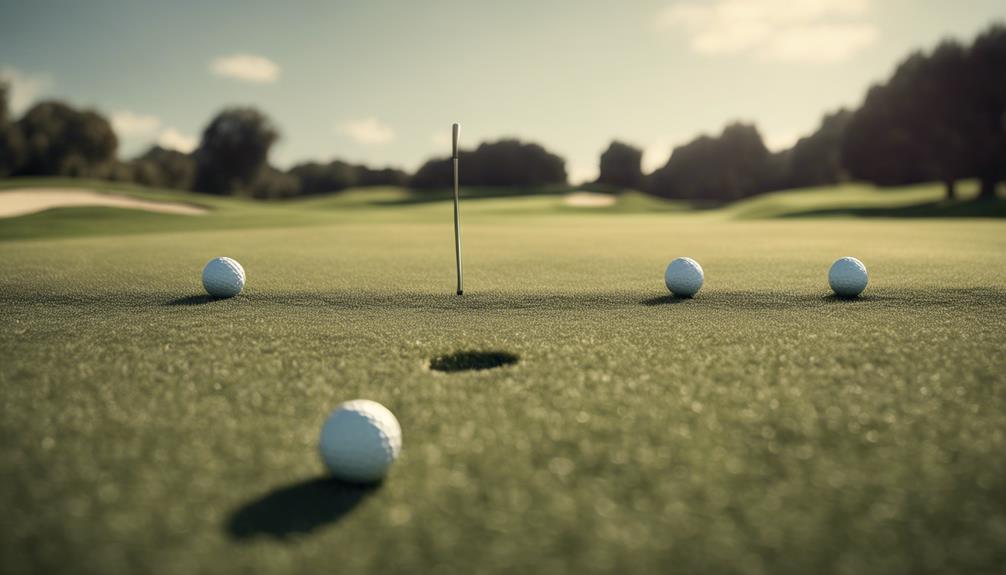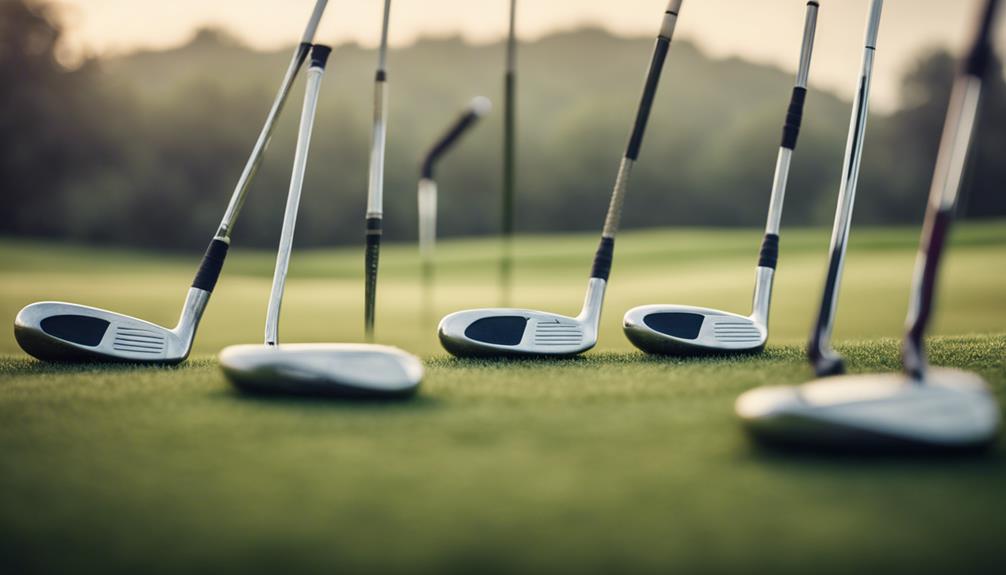- 7 Top Flite Golf Clubs XL for Improved Performance - September 28, 2024
- Top Flite Golf Clubs: Top 5 Reasons to Choose Them - September 28, 2024
- Top 3 Golf Club Fitters for a Perfect Swing - September 28, 2024
When you're faced with a 100-yard shot, your club selection depends on your swing style, situation, and desired trajectory. For high-arcing shots, wedges like the 58-degree or 56-degree are ideal. If you prefer a controlled trajectory, a 9-iron or 7-iron might be your best bet. Gap wedges, like the 52-degree, offer more spin and control, while pitching wedges provide slightly longer distance capabilities. For consistency, try a 54-degree lob wedge, 9-iron, or pitching wedge with a full swing. As you navigate your options, consider your unique swing characteristics to make the most informed decision – and uncover the secrets to pin-point accuracy.
Key Takeaways
- For 100 yards, a 54-degree lob wedge or a pitching wedge can provide high accuracy and consistency with a full swing.
- A 7-iron or hybrid can be a good choice for golfers with higher swing speeds, offering a lower trajectory and more roll.
- Gap wedges (52-56 degrees) offer higher trajectories and more spin, making them ideal for shots requiring high precision and control.
- A 9-iron is a popular choice for controlled trajectory and quick stopping on the green, especially for golfers with slower swing speeds.
- The best club for 100 yards ultimately depends on individual swing style, proficiency level, and desired trajectory.
Club Selection for 100 Yards
When facing a 100-yard shot, you'll need to carefully consider your club selection, as the right choice depends on your individual swing style, the situation, and your desired trajectory.
For some golfers, a pitching wedge (PW) or gap wedge (GW) might be the go-to choice, while others may prefer a 52-degree to 60-degree wedge.
The key is to determine which club will give you the desired height and distance.
If you're a golfer who takes full swings, you might opt for a longer club, such as a 7-iron or hybrid.
However, if you're looking for a higher-arcing shot, a wedge might be a better fit.
Your proficiency level also plays a role in club selection.
As a lower handicapper, you might prefer the precision of a wedge, while higher handicappers might find more forgiveness with hybrids or irons.
Ultimately, mastering your wedge game requires experimentation and practice to determine which club works best for you in different situations.
Top Wedges for Soft Landing
Selecting the right wedge for soft landing within 100 yards can be a game-changer, and understanding the unique strengths of each loft angle is essential to making an informed decision.
When you need to get the ball high and land it softly, a high-loft wedge is your best bet.
The 58-degree wedge is ideal for shots requiring high spin and precision, making it a top choice for soft landing.
For shots requiring a higher trajectory and more spin, a 54-degree wedge with a full swing can achieve a distance of 85 yards.
If you're facing a front pin shot inside 50-60 yards, the 56-degree wedge is a popular choice, offering more control and accuracy for soft landing.
Don't forget about the 52-degree gap wedge, which can be used for shots between 75-76 yards, providing a higher trajectory and more spin for soft landing.
With the right wedge in your bag, you'll be able to navigate tight lies and tricky pin positions with confidence.
Irons for Controlled Trajectory

From 100 yards out, you need a club that delivers a controlled trajectory, and irons can be a better option than wedges, depending on your swing characteristics and the green's conditions.
A 9-iron is a popular choice, offering a controlled trajectory and a high likelihood of stopping the ball quickly on the green. However, if you have a higher swing speed, you might consider a 7-iron or 8-iron, which provide a more penetrating trajectory and less spin than a wedge.
When choosing an iron for a 100-yard shot, consider the pin position, green slope, and speed. These factors will influence the trajectory and spin you need to achieve a precise landing.
A well-executed iron shot can provide more control and consistency than a wedge, especially if you're comfortable with a slightly lower trajectory. Ultimately, the key to success lies in understanding your swing characteristics and adjusting your club selection accordingly.
Gap Wedge Vs Pitching Wedge
You'll need to decide between a gap wedge and pitching wedge when facing shots from 90-140 yards out, as each club's unique characteristics can profoundly impact your ball flight and overall scoring.
The choice isn't straightforward, but understanding the differences between these clubs can help you make an informed decision.
Key factors for evaluation:
Loft and trajectory: Gap wedges (48-52°) provide a higher trajectory and more spin than pitching wedges (45-48°), making them ideal for shots from 90-120 yards.
Distance and control: Gap wedges offer more control and accuracy, while pitching wedges provide slightly longer distance capabilities.
Swing style and preference: Your individual swing style, ball flight, and personal preference will ultimately dictate which club is best for you.
Best Clubs for Consistency

When seeking consistency in your short game, identifying the right club for shots from 100 yards can make all the difference in refining your technique and delivering repeatable results. You may find that using a single club for these shots helps you develop a repeatable swing and technique, leading to more consistent outcomes.
A 54-degree lob wedge is a popular choice for shots from 100 yards, offering a high trajectory and spin. Alternatively, taking full swings with a 9-iron or pitching wedge can provide consistency, as you generate more power and speed, resulting in a more predictable distance and trajectory. If you struggle with higher lofted clubs, consider knockdown shots with a 7-iron or 8-iron, which offer a lower trajectory and less spin.
To maximize consistency, practice regularly with your chosen club and technique. This will help you develop muscle memory and a neutral swing, allowing you to rely on your technique in different situations. Pair your club with a high-quality ball like the Chrome Soft, designed for superior spin and control. By mastering your 100-yard shot with the right club and technique, you'll be well on your way to achieving consistency in your short game.
Frequently Asked Questions
What Club Do Pros Use From 100 Yards?
When you're 100 yards out, you're likely wondering what club the pros reach for. As a skilled golfer, you know it depends on your swing style, shot selection, and club fitting; Tour players often opt for a gap or lob wedge, considering course conditions and pin placement.
What Club Do I Use for 50 Yards?
As you step onto the lush green, executing sand shots from 50 yards demands precision. You'll want to weigh, honing your swing technique, and mastering yardage guessing to determine whether a 58-, 56-, or 54-degree wedge is your trusted companion.
Do You Need a 52 Degree Wedge?
When choosing a wedge, you're considering a 52-degree option, which offers superior club versatility, loft options, and angle control, allowing you to master wedge selection and optimize your short game performance.
How Many Yards Should Each Club Go?
As you set out on a quest for precision, remember that mastering club distance is key. Consult your yardage chart, factoring in swing speed and loft angle, to determine how many yards each club should travel, ensuring a harmonious dance between clubhead and ball.
Conclusion
Precise play piercing the 100-yard mark demands deliberate club selection.
By mastering the nuances of wedges, irons, and gap vs pitching wedges, you'll pinpoint precision.
Focus on finesse with forgiving clubs that facilitate fluid follow-through, fostering flawless flights that find the fairway.
With the right arsenal, you'll conquer consistency, commanding crisp contact and curating a coveted short game.




